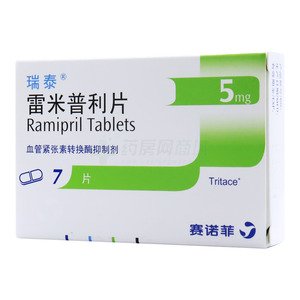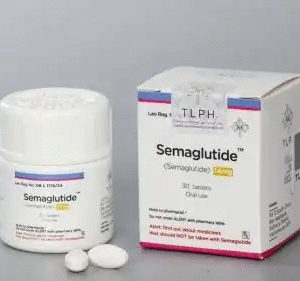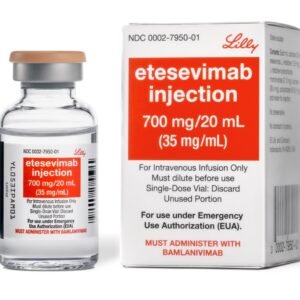Ramipril
Effects and efficacy: Ramipril tablets are mainly used to treat essential hypertension, congestive heart failure, and mild to moderate heart failure that occurs 2 to 9 days after acute myocardial infarction. This product can be used for non-diabetic nephropathy patients with creatinine clearance <70ml/min/1.73m2 and urine protein >1g/day, especially those with arterial hypertension. This product can reduce the risk of myocardial infarction, stroke and death from cardiovascular causes. Usage and dosage: When using ramipril for treatment, the dose should be adjusted strictly according to the doctor’s instructions. In the early stage of ramipril treatment, especially in patients with salt and/or fluid loss (such as vomiting/diarrhea, diuretic therapy), heart failure patients (especially after myocardial infarction), or severe hypertension patients, it is recommended to correct salt and/or fluid loss before starting ramipril treatment, reduce or stop the current diuretics for at least 2 to 3 days (in patients with heart failure, the risk of excessive volume load must be weighed). These patients should take 1.25mg of ramipril in the morning. Elderly patients (over 65 years old) should take 1.25 mg of ramipril daily. Patients with malignant hypertension or heart failure (especially after acute myocardial infarction) should be hospitalized when treated with this product. Patients with normal renal function should take the medicine as prescribed by the doctor. The doctor can refer to the following dosage. Since each patient responds differently to the drug, it needs to be adjusted according to the specific situation. Patients with primary hypertension: The starting dose is generally 2.5 mg of ramipril in the morning. If the blood pressure cannot return to normal at this dose, it can be increased to 5 mg per day. There should be at least a 3-week interval when increasing the dose. The maintenance dose is generally 2.5~5 mg per day, and the maximum dose is 10 mg per day. If the antihypertensive effect of 5 mg of ramipril is not ideal, diuretics should be considered. Patients with congestive heart failure: The initial dosage is once a day, 1.25 mg each time. The dose can be increased according to the patient’s response. If the dose is increased, it is recommended to double the dose after an interval of 1 to 2 weeks. If 2.5 mg or more is required daily, it can be taken once or twice. The maximum daily dose allowed is 10 mg. Patients with mild to moderate heart failure (NYHA Ⅱ and Ⅲ) 2 to 9 days after acute myocardial infarction: Ramipril dose adjustment can only be performed in hemodynamically stable patients in hospital. Patients who are taking antihypertensive drugs must be monitored very closely to avoid excessive decrease in blood pressure. The starting dose is usually 2.5 mg of ramipril, taken once in the morning and evening. If the patient cannot tolerate this starting dose (such as hypotension), 1.25 mg should be used, taken once in the morning and evening. The dose can be increased later according to the patient’s condition. The dose can be doubled at intervals of 1 to 2 days to a maximum daily dose of 10 mg of ramipril, taken 5 mg in the morning and evening. The absorption of this product is not affected by food and can be taken with sufficient liquid before, during or after meals. After acute myocardial infarction, patients with heart failure should initially take a specific daily dose, divided into 2 doses in the morning and evening. In other cases, the daily dose can be taken once in the morning. For patients with heart failure after acute myocardial infarction, this product should be taken within 2 to 9 days after the infarction. It is recommended to take this product for at least 15 months.
Adverse reactions:
The safety profile of ramipril includes persistent dry cough and hypotension reactions, and serious adverse reactions include angioedema, hyperkalemia, renal or liver damage, pancreatitis, severe skin reactions, and neutropenia and agranulocytosis. The adverse reactions that may occur in each organ system are as follows. Cardiac abnormalities: Occasionally myocardial ischemia (including angina pectoris or myocardial infarction), tachycardia, arrhythmia, palpitations, and peripheral edema. Blood and lymphatic system abnormalities: Occasionally eosinophilia; rare cases of decreased white blood cell count (including neutropenia or agranulocytosis), decreased red blood cell count, decreased hemoglobin, and decreased platelet count; in addition, bone marrow failure, pancytopenia, and hemolytic anemia may also occur. Nervous system abnormalities: headache, dizziness (dizziness), etc. are common; vertigo, paresthesia, angustia (loss of taste), taste disorder (taste disorder) are rare; tremor and balance disorder are rare; others may also be cerebral ischemia (including ischemic stroke and transient ischemic attack), psychomotor skill impairment (impaired reaction), burning sensation, parosmia (smell disorder). Eye abnormalities: Occasionally visual disturbances (including blurred vision), conjunctivitis is rare. Ear and labyrinth abnormalities: Rare hearing loss and tinnitus. Respiratory system, chest and mediastinal abnormalities: Itchy cough without sputum, bronchitis, sinusitis, dyspnea, etc. are common; Occasionally bronchospasm, including asthma exacerbation, nasal congestion. Gastrointestinal abnormalities: Common adverse reactions include gastrointestinal inflammation (inflammatory reaction of the gastrointestinal tract), digestive disorders, abdominal discomfort, indigestion, diarrhea, nausea, vomiting; fatal pancreatitis (there have been very few fatal cases reported due to the use of ACE inhibitors), elevated pancreatic enzymes, angioedema of the small intestine, upper abdominal pain including gastritis, constipation, dry mouth; glossitis is rare; others include aphthous stomatitis (inflammatory reaction of the mouth). Kidney and urinary system abnormalities: Occasionally, renal impairment includes acute renal failure, increased urine volume, aggravation of existing proteinuria, increased blood urea, and increased blood creatinine. Skin and subcutaneous tissue disorders: Specific maculopapular rash, rash is common; fatal angioedema (very rare, fatal airway obstruction may occur due to edema); pruritus, hyperhidrosis (sweating); exfoliative dermatitis, urticaria, and nail peeling are rare; photosensitivity reactions are very rare; others include toxic epidermal necrolysis, Stevens-Johnson syndrome, erythema multiforme, pemphigus, psoriasis exacerbation, psoriatic dermatitis, pemphigoid or lichenoid rash or mucosal rash, and alopecia. Musculoskeletal and connective tissue disorders: common muscle cramps (muscle cramps), myalgia; occasional arthralgia. Endocrine system disorders: syndrome of inappropriate antidiuretic hormone secretion (SIADH). Metabolic and nutritional disorders: common increase in blood potassium; occasional anorexia and decreased appetite; and hyponatremia. Vascular abnormalities: common hypotension, orthostatic hypotension (postural adjustment disorder), syncope; occasional flushing; rare vascular stenosis, hypoperfusion (exacerbated perfusion disorder), vasculitis; Raynaud phenomenon may also occur. Systemic diseases and various reactions at the administration site: chest pain and fatigue are common; fever (fever) is rare; weakness (asthenia) is rare. Immune system abnormalities: allergic or anaphylactic reactions may occur (ACE inhibition can aggravate severe allergic and anaphylactic reactions to insect toxins), and antinuclear antibodies are elevated. Hepatobiliary system abnormalities: occasional increase in liver enzymes and/or conjugated bilirubin; cholestatic jaundice, rare hepatocellular damage; acute liver failure, cholestatic or cytolytic hepatitis (fatal consequences are extremely rare). Reproductive system and breast abnormalities: occasional temporary erectile dysfunction and decreased libido; male breast development may also occur. Mental disorders: occasional depression, anxiety, tension, restlessness, sleep disorders including drowsiness (drowsiness); confusional states are rare; attention disorders may occur.
Contraindications:
Contraindicated if allergic to this product Contraindicated during pregnancy Contraindicated during lactation Use with caution if liver function is impaired
Share:
Products
Our offers
Health Classification
Let us work together to protect precious health



























